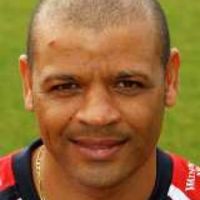Lancashire 143 for 4 (Prince 63*) beat Durham 141 (Stoneman 51, Jarvis 3-24, Faulkner 3-27)
Scorecard This match will be forgotten in two weeks, perhaps even in two days, some may have forgotten it already. Another T20. A T20 in cold, wet, dark Durham on a Thursday. But there was much to be savoured in this encounter between two teams desperate for a win.
Too often we are told that T20 is the most inferior of cricket's three formats: uncouth and brash it requires few and basic skills, is unsubtle and vacuous, but there was little evidence of such characteristics in a genuinely fascinating, high-skilled match.
The first ball of Durham's innings, struck for four, and in fact, the first six overs, blitzed for 61 and involving a pinch-hitter, suggested an evening of runs, but under moody skies the cricket that followed was tight, tense, and hard-fought. Runs were hard to come by and those who did succeed -
Ashwell Prince and
Mark Stoneman being the two batsmen to score more than 26 - did so in enjoyably contrasting methods.
This was a pitch, with uneven pace, bounce and seam, on which no batsman ever really seemed at ease. In future we will not, but perhaps we should, ask of batsmen who score runs around the world; 'but can he do it on a cold Thursday night in Durham?'
Stoneman had joy in a way that no other batsman did. He began Durham's Powerplay with what was in hindsight absurd aggression. Striking six fours and a six he propelled Durham through to 61 for 3 after six overs and 93 for 3 after ten. But Stoneman was an island of attack in amongst a sea of attrition. After the Powerplay Durham hit just three boundaries and hit none in the final 57 balls of the innings.
While the scoreboard may show that Lancashire's seamers took the majority of the wickets - Kyle Jarvis with 3 for 24 and James Faulkner 3 for 27 - it was the spinners who laid the foundations for their success. In fact, perhaps spinners is not the right word - slow bowlers would be better.
There was very little spin on offer, so much so that Steven Croft was at one point bowling little more than split-finger, leg-cutting drifters. But they were hugely effective. Stephan Parry and Aaron Lilley bowled more conventionally, but again with little turn available it was the canny changes of pace, shifts in line and clever use of flight and angles that unsettled Durham's batsmen who struggled for timing and fluency.
Lancashire's slow trio bowled 11 overs between them for just 61 runs, pulling Durham back from a strong start to choke the second half of their innings in which they scored just 48 for 7.
Although Durham's 141 felt under-par given their superb start, when Lancashire began their run-chase it was unclear whether they had bowled brilliantly or whether conditions had changed markedly.
Indeed although Lancashire always seemed in charge the chase was never easy. A lively 17-ball 26, a microcosm of modern batsmanship, from Karl Brown got Lancashire ahead of the rate, but just as it had for Durham, taking pace off the ball took wickets and stifled Lancashire's run-scoring.
But as long as Prince was at the crease, there was a sense of assurance to Lancashire's batting. He was dropped twice but manipulated the field expertly and picked off the occasional bad balls to score an excellent fifty. But against tight bowling it was not so much run-scoring as it was run-acquirement. Well that was at least until James Faulkner.
Used to such tight, tense finishes, Faulkner, with 40 still required from 27, clubbed a six to steady Lancashire's nerves. And when the last ball of the seventeenth over was hit for four by Prince and the first ball of the eighteenth hit for six by Faulkner the result was no longer in question.
There was still one more moment of drama to come though. Faulkner, looking to surge Lancashire to the target was outstandingly caught by Ryan Pringle diving and sliding towards the deep midwicket boundary. Pringle, aware that he was about to clip the boundary rope flicked the ball to Scott Borthwick who juggled it once, twice, and three more times before completing an amazing catch.
That the scoreboard will simply read c Borthwick belies the nature of the catch, just as the scoreboard will mask the true nature of an excellent match. In the end Lancashire won comfortably with eleven balls to spare and given the way they bowled and indeed Prince batted they were deserved winners, but the great Neville Cardus was certainly right when he famously wrote "there ought to be some other means of reckoning quality in this the best and loveliest of games; the scoreboard is an ass."
Freddie Wilde is a freelance T20 journalist. @fwildecricket

